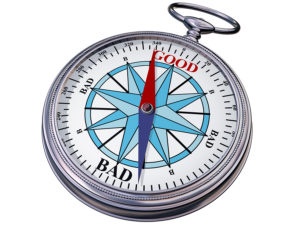———————————————————————————————————-
This is a fair objection, D.J. First off, My argument is not simply that because God is sovereign, that he can just do anything whatsoever. The book of Psalms does say that The Lord does whatever He pleases, but I would argue that the things you described above (Like deceiving people into becoming Christians thinking that becoming Christians will get them into Heaven when it is really the other way around) would not please Him. Deuteronomy 32:4 says “The Lord’s ways are perfect and all His ways are just. A perfect God who does no wrong. Upright and just is He.” . Likewise The Bible says in 1 John 1:5 “God is light and in Him, there is no darkness at all.” So, scripture teaches that God is morally perfect. Therefore, He just would not do the horrible things you described.
Of course, you clarified that this is only a hypothetical world and not the actual world. Biblical revelation tells us that God is morally good, but what biblical revelation does not tell us whether God is necessarily good. For all one could glean from scripture, perhaps it is merely the case that God just happens to be good. In other words, God’s goodness could be an accidental property rather than an essential property.
But if we move beyond biblical revelation and take into account Perfect Being Theology and Natural Theology, we go beyond concluding that “God is good” into concluding that “God is necessarily good”. If we conclude that God’s moral character is necessarily good rather than accidentally good, then the hypothetical world you described is not a possible world at all. For in any possible world, we find God with the same moral nature as in the actual world. The term “Bad God” would be referring to as unactualizable a state of affairs as the term “one ended stick”.
So what does Natural Theology say? For readers who don’t know, Natural Theology is just a fancy way of saying “Arguments for God’s Existence”. These are arguments that don’t rely on The Bible at all to support their premises, but purely on human reasoning.
The arguments that I have in mind regarding this issue are The Moral Argument and The Ontological Argument. Both of these arguments show that not only does God exist, but that He is necessarily good, infinitely good, and cannot be anything but good. So the next question is; are these arguments sound or are they not? Well, let’s look at them.
The Moral Argument
The Moral Argument goes as follows:
1: If God does not exist, objective moral values and duties do not exist.
2: Objective moral values and duties do exist.
3: Therefore, God exists.
This argument has valid logic since the syllogism takes the form modus tollens. Since the logic is valid, we simply need to see whether the premises are true or not.
Defense of Premise 1
First, let me point out the difference between moral values and moral duties. Moral values have to do with what is good and bad. Moral duties have to do with what is right and wrong. Now, at first you might think that this is a distinction without a difference. But if you really think about it, you can see that there is a difference. For example, it would be good for you to become a doctor,but you do not have to become a doctor. You are not morally obligated to become a doctor. After all, it would also be good for you to become a police officer or a scientist or a New Testament professor, but you can’t do all of them! Clearly, just because something is good, that does not necessarily mean that it is your moral duty to do it. Moral duties are different. While you are not obligated to become a police officer, you are indeed obligated to give to the needy, help the sick, stay faithful to your spouse, and so on.
The first premise of this argument states that if God does not exist, then what we call good and bad, and right and wrong mere merely subjective or relative. They are just matters of personal taste, public opinion, or societal conditioning. Is this actually the case? I think it is.
Moral Values
If atheism is true, what would make human brings intrinsically valuable? I’m atheism, human beings are just smart monkeys in suits. I’m atheism, man is just a biological organism. There are other biological organisms in the world. What makes human beings more valuable than the life of a mosquito or a flea or a tree? Most people don’t think that you are a murderer if you cut down a tree, but they do think you are a murderer if you cut down a man. But why? On the atheistic worldview, both the man and the tree are biological organisms composed of DNA molecules and atoms. Why is one set of atoms worth preserving and the other one, permissible to dismember?
Is there really any moral difference between the Holocaust and exterminating an entire hill of ants? There is a biological difference to be sure, for one is the extermination of apes and the other is the extermination insects. But looking at the situation through the lens of the atheistic worldview, I can’t see any moral difference between the two. “What an awful thing to say” I can imagine you thinking. I agree that it is a terrible thing to say, but this is the logical entailment of the atheistic worldview.
If atheism is true, then man is just an ape on a tiny speck of dust called Earth lost in a hostile and mindless universe that cares not whether he lives or dies. Moral Values are unintelligible from the perspective of the atheistic worldview.
Moral Duties
If moral values cannot exist in the atheistic worldview, then moral duties cannot exist either. The denial of moral values entails the denial of moral duties. You cannot have one without the other. If human life is of equal value to that of a flea’s, then you have just as much moral obligation to your fellow man as you do a flea.
Defense Of Premise 2
Although good and evil and right and wrong cannot exist on the atheist’s worldview, deep down, we all know that they do exist.
We can sense that some things are truly good and that others are truly evil. We have moral intuitions that tell us that taking care of a baby is morally right and torturing a baby is morally wrong. Just as our sensory experience tells us that a world of physical objects is real, so our moral sense tells us that good and evil are real.
Moreover, just as no one can get outside of their 5 senses to see for sure whether or not they are giving them reliable information, so we cannot get outside of our moral sense to test whether it’s giving us reliable information. But that should not give us reason to doubt whether physical objects or objective morality is real.
In my experience, atheists who try to cast doubt on our moral intuitions (and therefore, the ability to confirm this premise) typically make arguments that, if applied to our physical senses, would remove our ability to know things about the external world. For example, some of them argue that “People disagree on whether X is right or wrong, so our moral intuitions are unreliable in determining whether right and wrong exist.” But imagine this logic being applied to our physical sense of sight. You would not be able to know whether color is an objective part of the physical world. After all, some people are color blind and others aren’t! Some people can perceive color but disagree on a particular shade of color. Don’t forget that an entire internet sensation known as “The Dress” was founded on a disagreement as to whether the dress was gold and white or black and blue. The reductio ad absurdum shows that this is not a valid response.
Conclusion: Therefore, God Exists.
Given the truth of the two premises, the conclusion follows. What kind of God is needed to ground the existence of objective moral values and duties? This argument requires that a necessary, morally perfect, personal Being exist whose moral character is the measuring stick of good and evil. He must be necessary because many moral truths appear to be necessarily true (it doesn’t “just happen” to be true that raping little children is evil, for example), and necessary truths can’t be grounded in a contingent being. He must be morally perfect because an evil being can’t be the standard of morality. Why? Because if that were the case, Hitler would be closer to meeting the standard of The Good than Mother Teresa.
The Ontological Argument
Now, before I go on to list and defend the premises of the argument, let me first explain some of the unique terminologies that will come into play for those without a background in philosophy. The Ontological Argument employs terms like “Possible Worlds” and “Maximally Great Being”.
Possible Worlds = A maximal description of the way the world could be. It is simply a complete list of logically possible states of affairs that could be true of reality. At least one of these lists of logically possible states of affairs will be true of reality. If you still find the term “Possible Worlds” confusing, just substitute it for the term “Possible Lists” instead. Imagine you have multiple sheets of notebook paper, and each list has a sentence describing a logically coherent state of affairs which could be true of reality, such as “Evan Minton is typing a blog post”, “Evan is wearing a Pokemon shirt while he types”, “Evan typed up the first half of his blog post on his tablet”, and so on. These statements listed one after another on your notebook paper are all states of affairs that could exist, and so, form a possible list. I’ll confess, all of the prior statements are not only true of a possible world/list, they’re true of the actual world/list. Now, if you change some statements on your sheet of paper, you arrive at a different list. This is really all a possible world is: an exhaustive list of statements that could be true of reality.
Maximally Great Being = This is a being that has all properties or attributes that go to make a person great (e.g power, knowledge, presence, moral goodness) and it has these properties to the greatest extent possible (i.e omnipotent, omniscient, omnipresent, morally perfect). If an attribute would make a person great if he had it, a Maximally Great Being will have that attribute, and moreover, will have it to the greatest extent possible.
Now that we’ve defined our terms, let’s look at the premises of this argument.
1: It is possible that a Maximally Great Being exists.
2: If it is possible that a Maximally Great Being exists, then a Maximally Great Being exists in some possible world.
3: If a Maximally Great Being exists in some possible world, then it exists in every possible world.
4: If a Maximally Great Being exists in every possible world, then it exists in the actual world.
5: If a Maximally Great Being exists in the actual world, then a Maximally Great Being exists.
6: Therefore, a Maximally Great Being exists.
This is a logically valid argument. The conclusion follows from the premises by the rules of logic.
Premise 1: It is possible that a Maximally Great Being Exists
By possible, I mean that something like a Maximally Great Being (MGB) could exist in reality. I don’t mean it like a weak agnostic that says “Well, it’s possible that a Maximally Great Being exists and it’s possible that He doesn’t.” I mean that an MGB is metaphysically or logically possible. It does seem to me that this premise is true. I don’t see any reason to think that it isn’t possible that an omnipotent, omniscient, omnipresent, morally perfect, necessarily existent being exists. Such an entity seems intuitively possible.
Premise 2: If It Is Possible That A Maximally Great Being Exists, Then A Maximally Great Being Exists In Some Possible World
This premise follows from the first. If the existence of anything is logically possible, then it exists in some possible world. The only way it would exist in no possible world would be if the thing in question were logically impossible, such as a square circle, one ended stick, a married unmarried man, or a physical object with no shape. Such things are contradictions. A shape is either a square or a circle, but not both. A man is either married or unmarried, but he can’t be both! A stick always has two ends. These things violate the laws of logic and therefore exist in no possible world. By contrast, things like a little green alien or a unicorn, while these don’t exist in the actual world, they do exist in some possible worlds because their existence is possible. If God’s existence is possible (see premise 1), then He at least exists in some possible worlds.
Premise 3: If A Maximally Great Being exists in some possible world, then He exists in every possible world.
This premise is true because of how one defines an MGB. A Maximally Great Being is, by virtue of being maximally great, necessarily existent. A Being who is necessarily existent is intuitively greater than one who is contingently existent. When something necessarily exists, this means that it could not possibly fail to exist. Its non-existence is impossible. Many mathematicians think that numbers, sets, and other mathematical entities exist in this way. If they exist, they have to exist and could not possibly fail to exist.
Now, if a necessary being exists in some possible world, it is impossible for it to not exist in all other possible worlds. 2+2=4 is a logically necessary truth. If it’s necessarily true in some possible world, it will be true in all of them. 2+2=4 is a logically necessary truth. If it’s necessarily true in some possible world, it will be true in all of them. 2+2 will not equal 4 in some possible worlds, but 5 in others. Necessary truth and necessarily existent being either exist in all possible worlds.
Premise 4: If A Maximally Great Being Exists in every possible world, then it exists in the actual world.
This premise follows from the previous one. If a Maximally Great Being exists in every possible world, then, of course, it will exist in the actual world. The actual world is a possible world. We know this precisely because it is actual. If it were an impossible world (like a world with a square circle) then it would not and could not exist. Given that it does exist, we know that it certainly is logically possible.
Premise 5: If A Maximally Great Being Exists In The Actual World, then a Maximally Great Being Exists.
Obviously, if something exists in the actual world, it actually exists.
Conclusion: Therefore, A Maximally Great Being Exists.
An omnipotent, omniscient, omnipresent, morally perfect, necessarily existent being exists in the actual world.
The premises of both of this, so it follows that a necessarily existent, morally perfect, omnipotent, omniscient, omnipresent, personal being exists.
Summary And Conclusion
There could be a lot more said about this topic. For those interested, including yourself, D.J, check out my book Inference To The One True God: Why I Believe In Jesus Instead Of Other Gods. I devote entire chapters to these arguments in chapters 4 and 5. Anyway, the point here is that while The Bible tells us that God is good, it doesn’t tell us that God’s character is essentially or necessarily good (i.e could not have been otherwise). To conclude that, one must turn to philosophy as we have in this blog post. Natural Theology demonstrates the existence of a God who is a Maximally Great Being, and is therefore morally perfect since goodness is a great-making property, and you must have all great-making properties in order to be maximally great. They demonstrate the existence of a cosmic moral scale upon which every moral action, behavior, and person is compared to. Those who are farther away from the moral character of this scale, we call bad. Those who approximate closer to it, we call good.
So, since God has a moral nature that is essentially good, there is no possible world in which he “could indoctrinate the poor souls he creates with empty promises of eternal bliss, dangle a few pleasures or work a few miracles in front of them to persuade them that he is actually a Good God, then burn everyone in hell for eternity whom he assured would go to heaven.” Being essentially good will constrain His actions to a degree.
Now, I would like to add that with respect to taking life, it’s not just that God is sovereign and is the origin of all life that gives him the right to do this. When you consider that He actually has reasons for taking life (rather than only does them on a whim), you can see that He’s justified. For the Christian, physical death is actually a blessing, for it is the entrance into paradise with our heavenly Father and brother Jesus. As the apostle put it; “To live is Christ, to die is gain” (Philippians 1:21) and we gain because we go to be with Him in paradise (Luke 23:43), because “to be away from the body is to be at home with the Lord” (2 Corinthians 5:8). In the case of Old Testament killings such as The Canaanites and the youths that harrassed Israel, these were acts of judgment, comparable to capital punishment. The Canaanites were a desperately wicked people whom God had patience with for over 400 years. They, among other things, sacrificed their children to the god Molech. In the case of the youths that harassed Elijah, this was more likely than not an act to keep the prophet Elisha safe from an angry mob (see the longer explanation here). So, although God is not in the wrong because He, as the author of life, has the right to take it, I can’t recall a specific instance in The Bible where He did not have a specific reason for doing so. As a loving and just God, He doesn’t just end lives on a whim. He is not capricious.
If you have any questions about Christian theology or apologetics, send Mr. Minton an E-mail at CerebralFaith@Gmail.com. It doesn’t matter whether you’re a Christian or Non-Christian, whether your question is about doubts you’re having or about something you read in The Bible that confused you. Send your question in, whatever it may be, and Mr. Minton will respond in a blog post just like this one.
Share this:
- Share on Facebook (Opens in new window) Facebook
- Share on X (Opens in new window) X
- Print (Opens in new window) Print
- Email a link to a friend (Opens in new window) Email
- Share on Pinterest (Opens in new window) Pinterest
- Share on Reddit (Opens in new window) Reddit
- Share on LinkedIn (Opens in new window) LinkedIn
- Share on Tumblr (Opens in new window) Tumblr
Discover more from Cerebral Faith
Subscribe to get the latest posts sent to your email.






